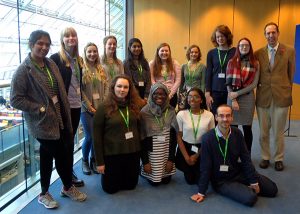
These pages aim to be a step by step guide to undertaking a successful research project.
- Step 1 – Developing a Project Title
- Step 2 – Designing your Experiment
- Step 3 – Getting into the lab!
- Step 4 – Communicating your project

Here are five good reasons to do a project:
- It gives you freedom to do a piece of research on a subject – or a combination of subjects – you are really interested in.
- It can help you decide whether you want to continue to work or study in your project area.
- It’s a good example of independent working, which you can mention in interviews – for jobs, apprenticeships or university.
- If you are thinking of going to university, an EPQ gives you UCAS points and helps you to stand out from the crowd in university applications.
- It helps you develop the independent research and critical thinking skills that you will need at university.
There are so many benefits to completing a project!
Researching a topic in science can help you develop new skills. Leading your own investigation is a great way to get a taste of scientific research and to develop practical problem-solving skills.
Designing your own Experiment, using new equipment, collecting and analysing your own Data, and testing your own Hypothesis are rewarding and motivating, as well as being fun! This will challenge you too – you will often need to seek guidance from experts, which can help you improve your communication and team-working skills.
It’s a great chance to discover more than you’ve learned in class. In fact, doing original research means you might be the first person to answer your research question – some students have even had work published in scientific publications.
Many extended projects result in a dissertation. But they are also a fantastic chance for you to carry out a scientific investigation or to design and build something. It should take around 120 hours to complete an EPQ, similar to half an A level. This significant commitment gives you enough time to produce something really meaningful. Like an A level, an EPQ can be awarded any grade up to A*.

Take a look at what students at Peter Symonds Sixth Form College in Winchester have been involved in. Click here to watch their video. You can also read more about how they presented their scientific research at the Authentic Biology Symposium in London.
Find out about projects other students have undertaken:
 |
 |
 |
| Meet Charlotte, who is now studying Pharmacy. | Meet Alice, who is now studying Biological Sciences. | Meet Anita, who is now studying Biology and German. |
